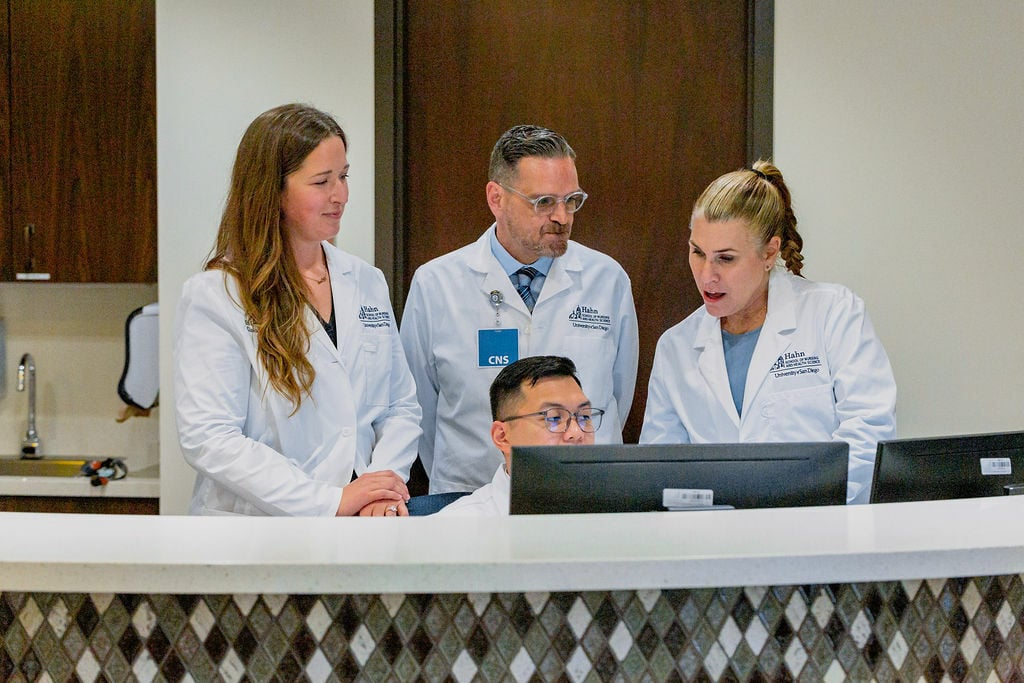
Discover the Benefits of a Nursing Degree From USD
The information in this blog post is for informational purposes only and is not intended to replace medical, financial, or professional advice.
Are you considering a Master of Science in Nursing (MSN) but are unsure about the career opportunities it offers? An MSN is one of the most common advanced nursing degrees, opening doors to higher-paying roles, leadership positions, and specialized career paths where you can make an even greater impact in healthcare. Whether you're just beginning to explore your options or want to see where an MSN can take you, this guide will help you navigate your next steps.
What Is a Master of Science in Nursing?
A Master of Science in Nursing (MSN) is a graduate-level degree for registered nurses that builds upon a Bachelor of Science in Nursing (BSN), preparing nurses for advanced clinical and leadership roles. It also allows nurses to explore areas of specialization.
Why Earn an MSN?
The MSN is a highly valuable degree among nurses — and for good reason. It opens doors to specializations, leadership opportunities, and even doctoral pathways, making it a valuable step for career advancement.
- Specialization opportunities: Students can gain experience in specialized tracks such as adult-gerontology and family practice. At USD, MSN students can choose from specialized tracks such as Family Nurse Practitioner (FNP) and Adult-Gerontology Clinical Nurse Specialist — two high-demand areas that equip graduates for advanced practice roles.
- Career advancement: An MSN prepares you for non-clinical leadership roles such as chief nursing officer, clinical analyst, and clinical information systems specialist. Many graduates also pursue additional certifications aligned with their chosen speciality.
- Pathway to a doctoral degree (PhD or DNP): For those looking to expand their knowledge and research capabilities, an MSN can serve as a stepping stone to a doctoral degree. Whether you’re pursuing a PhD for research or a Doctor of Nursing Practice (DNP) to further develop your clinical leadership, the MSN provides the foundation you need.
- Opportunities in education and research: An MSN can lead to roles in nursing education, helping train the next generation of nurses.
- Leadership skill development: MSN programs foster critical leadership, clinical reasoning, and decision-making skills essential for navigating complex healthcare systems and improving patient outcomes.
- Learn from expert faculty: Students benefit from small class sizes and direct access to nationally recognized faculty who are active clinicians, scholars, and mentors in their respective field.
- Higher earning potential: Earning an MSN significantly boosts your earning potential. Advanced practice nurses, like nurse practitioners and clinical nurse specialists, often earn higher salaries compared to their RN counterparts.
Job Growth & Industry Demand for MSN Roles
Nursing jobs are in high demand due to an aging population and a growing need for healthcare services, and MSN-prepared nurses are especially sought after for their specialized skills and leadership abilities. With advanced expertise, they play a crucial role in improving patient care, shaping healthcare policies, and driving innovation in the field.
According to a report from the U.S. Chamber of Commerce, citing data from the U.S. Bureau of Labor Statistics, nurse practitioners are projected to be one of the most in-demand healthcare jobs over the next decade.
Additionally, nursing educators are in high demand, as nursing programs turn away many qualified applicants each year due to a shortage of faculty, which impacts the potential for training new nurses.

Choosing Between an MSN and Other Advanced Nursing Options
The MSN focuses on advanced clinical practice, leadership, and education. It’s ideal for nurses who want to advance their careers in patient care, management, or teaching — without the immediate need for a doctorate.
The two doctorate degrees in nursing — the DNP and the PhD in Nursing — are both terminal degrees, each suited for nurses with different career goals and areas of focus.
The DNP focuses on advanced clinical practice and leadership, making it well-suited for nurses who want to lead healthcare organizations and improve patient outcomes.
A PhD in Nursing, on the other hand, emphasizes research and healthcare policy development, making it a great choice for nurses interested in advancing knowledge, shaping education, or influencing policy.
MSN Tracks & Career Paths
A general MSN degree provides a broad foundation in advanced nursing practice, leadership, and education without focusing on a specific specialty. However, many MSN programs offer tracks that allow you to develop expertise in a particular area of nursing. Some of the most popular tracks include:
- Nurse Practitioner (NP): This degree track prepares you to become a nurse practitioner, which is an advanced practice registered nurse (APRN) who provides acute and primary care to patients of all ages. There are also subspeciality NP tracks:
- Family Nurse Practitioner: Provides family-focused primary care across all ages, from infants to seniors.
- Pediatric Nurse Practitioner: Specializes in caring for infants, children, and adolescents.
- Geriatric Nurse Practitioner: Focuses on the unique healthcare needs of older adults.
- Psychiatric Mental Health Nurse Practitioner (PMHNP): Specializes in mental health across the lifespan.
- Clinical Nurse Specialist: The CNS track equips you with advanced clinical skills as an APRN and offers specialization options in areas such as critical care, pediatrics, or geriatrics.
- Nurse Education: If you’re passionate about teaching, this track prepares you to educate in academic settings, clinical environments, and professional development programs.
- Nursing Leadership and Administration: This track prepares nurses for management and senior-level roles, making it an excellent choice for those pursuing leadership positions in healthcare.
- Public Health Nursing: This track prepares you to work with or within global organizations, government agencies, school systems, and healthcare providers to educate communities and tackle public health challenges.
- Nursing Informatics: For those drawn to the data and analytics side of healthcare, this track blends nursing expertise with cutting-edge technology to improve patient care and healthcare systems.
Top MSN Jobs & Salaries
What roles can you pursue with an MSN? Below are some of the most common positions, along with their key responsibilities and potential salary ranges. Keep in mind that salaries will vary based on factors such as employer, required experience and education, and location.
Advanced Practice Registered Nursing Roles
Nurse Practitioner (NP)
Role overview: A Nurse Practitioner is an advanced practice registered nurse who provides primary and specialized care to patients. They are licensed to diagnose, treat, and manage medical conditions.
Responsibilities: Perform physical exams and assessments, order and analyze the results of diagnostic tests, diagnose and treat illnesses and injuries, prescribe medications, educate patients, and collaborate with other healthcare professionals to develop care plans.
Salary range: $106,960–$140,610
Certified Nurse Midwife (CNM)
Role overview: A Certified Nurse Midwife specializes in providing care for women throughout their reproductive lifespan, including gynecological, prenatal, labor, delivery, and postpartum care.
Responsibilities: Provide prenatal care and monitor fetal development, perform routine gynecological exams, offer care and support during labor and delivery (including delivering babies), educate new parents on infant care and what to expect during the birthing process, order tests and screenings to monitor the health of the mother and baby, diagnose and treat gynecological disorders (such as sexually transmitted infections and infertility), and provide postpartum care and support for new parents.
Salary range: $110,000–$146,770
Certified Registered Nurse Anesthetist (CRNA)
Role overview: A Certified Registered Nurse Anesthetist is a highly trained nurse who specializes in administering anesthesia to patients before, during, and after surgical procedures.
Responsibilities: Administer anesthesia and medications to patients; monitor patients before, during, and after anesthesia; educate patients on anesthesia process, risks, and recovery; identify potential risks and assess health conditions before administering anesthesia; and ensure safe and effective anesthesia care.
Salary range: $180,840–$212,650
Clinical Nurse Specialist (CNS)
Role overview: A Clinical Nurse Specialist is an advanced practitioner who diagnoses and treats patients, focusing on specific populations or healthcare areas.
Responsibilities: Diagnose and treat patients with complicated or specialized healthcare needs, prescribe medications and develop treatment plans, educate patients and families on managing specific conditions, and conduct research to improve patient care and treatment outcomes.
Salary range: $71,000–$101,500
Specialized Nursing Roles
Pediatric nurse practitioner
Role overview: A Pediatric Nurse Practitioner provides care to children ranging from newborns to adolescents and young adults.
Responsibilities: Perform wellness exams and developmental screenings, conduct school physicals, provide childhood immunizations, diagnose and treat common illnesses, manage chronic conditions such as asthma and diabetes, educate parents on common health concerns and issues, screen for and manage mental health conditions, prescribe medications, and order diagnostic tests.
Salary range: $110,000–$170,000
Neonatal Nurse Practitioner
Role overview: A Neonatal Nurse Practitioner provides care to premature and critically ill newborns experiencing health issues such as low birth weight, infections, or heart abnormalities.
Responsibilities: Perform assessments and physical exams, diagnose and treat medical conditions, administer medications and treatments, manage ventilators and other life-support equipment, educate parents on infant care and development, order and interpret lab results, and assist in delivery of high-risk infants.
Salary range: $120,000–$157,000
Psychiatric Mental Health Nurse Practitioner (PMHNP)
Role overview: A Psychiatric Mental Health Nurse Practitioner provides specialized care to patients with mental health conditions and substance use disorders.
Responsibilities: Assess, diagnose, and treat patients with a range of mental health disorders; collaborate with other healthcare professionals to assist with patient recovery and coping skills; help patients manage symptoms; prescribe and manage medications and other treatments; educate patients and families about their diagnoses; and coordinate services between other providers.
Salary range: $120,500–$154,000
Adult-Gerontology Nurse Practitioner
Role overview: An Adult-Gerontology Nurse Practitioner provides care to adult and elderly populations. These nurses also have the option of becoming an Adult-Gerontology NP with an oncology specialization.
Responsibilities: Assess, diagnose, and treat patients with acute and chronic health conditions; prescribe medication; create customized treatment plans; provide primary care services, including physical exams; educate patients and their families on how to manage chronic conditions; and order and interpret diagnostic tests.
Salary range: $115,000–$127,500
Adult-Gerontology Clinical Nurse Specialist
Role overview: An Adult-Gerontology Clinical Nurse Specialist specializes in improving the quality of care for adult and elderly populations.
Responsibilities: Provide consultations to healthcare teams, design and implement care strategies and treatment plans, lead initiatives aimed at improving patient care and safety, mentor and train nursing staff to ensure the use of best practices, and advocate for policy changes to enhance care delivery.
Salary range: $71,000–$101,500
Administrative/Leadership Roles
Chief Nursing Officer
Role overview: A Chief Nursing Officer is a senior leadership position responsible for overseeing nursing operations at the executive level. This role ensures the strategic, financial, and operational management of nursing services, driving high-quality patient care, optimal patient outcomes, and operational efficiency.
Responsibilities: Direct, supervise, and coordinate nursing teams; ensure nurses provide the highest level of patient care; develop and implement programs, policies, and procedures; manage budgets and allocate resources; collaborate with senior leadership to address challenges, set goals, and strategize.
Salary range: $126,000–$173,000
Clinical Nurse Leader
Role overview: A Clinical Nurse Leader focuses on coordinating care and improving quality at the unit level. While not considered an advanced practice registered nurse (APRN) role, it remains a leadership position with direct patient impact.
Responsibilities: Provide care coordination and transition of care, measure patient outcomes and evaluate care effectiveness, implement evidence-based best practices, lead quality improvement initiatives, advocate for patients and their families, support and supervise nursing staff, and analyze clinical data to monitor trends and identify areas of improvement.
Salary range: $71,000–$104,500
Nurse Manager
Role overview: A Nurse Manager oversees a specific department, unit, or group of nurses within a hospital or healthcare facility.
Responsibilities: Recruit, train, and evaluate nursing staff; monitor the quality of patient care within their unit; manage departmental budgets and resources; develop, implement, and evaluate nursing policies and procedures; work with other healthcare professionals to develop care plans; track and analyze performance metrics; and address any staffing or patient-related concerns.
Salary range: $79,500–$116,000
Director of Nursing
Role overview: A Director of Nursing is a senior-level management position that manages all the administrative aspects of the nursing department at a healthcare facility or hospital. This role involves strategic planning, resource allocation, and ensuring the department meets all operational and regulatory standards.
Responsibilities: Hire and train nursing staff, develop budgets and business plans, implement new policies and procedures, set department goals, oversee the nursing budget, ensure nurses provide the highest quality of patient care, and meet all regulatory and clinical standards.
Salary range: $116,000–$188,000
Public Health and Community Nursing Roles
Public Health Nurse
Role overview: A Public Health Nurse works to educate communities or specific populations about health issues, trends, and risks. They play a key role in responding to public health crises, connecting individuals to vital community programs and resources, and advocating for better healthcare access. In some cases, they also provide direct patient care, particularly in underserved areas.
Responsibilities: Develop and implement community health programs, educate the public on disease prevention and healthy living, conduct health screenings and assessments, respond to public health crises, advocate for healthcare access, and collaborate with healthcare providers and community organizations.
Salary range: $61,000–$89,500
Community Health Nurse
Role overview: A Community Health Nurse provides care and services in diverse healthcare settings, including clinics, homeless shelters, schools, and community centers. They focus on disease prevention, health education, and connecting individuals to essential resources.
Responsibilities: Assesses, evaluates, and treats patients; advocates for patients, especially in underserved communities; refers patients to essential resources; promotes overall health and wellness, including nutrition education; conducts health screenings; provides family planning education; and supports disease prevention initiatives within the community.
Salary range: $68,000–$90,500
Nursing Informatics and Technology Roles
Nursing informaticist
Role overview: A Nursing Informaticist bridges the gap between healthcare and technology by managing and optimizing electronic health records (EHRs), data systems, and digital tools to improve patient care and nursing workflows.
Responsibilities: Develop and maintain EHRs, analyze data to improve patient care and operational efficiency, collaborate with other professionals and teams to implement new technologies, and train nurses and other staff on digital systems and best practices.
Salary range: $70,000–$122,500
Clinical Informatics Specialist
Role overview: A Clinical Informatics Specialist has a broader focus than nursing informatics, working across all clinical areas to improve the integration of healthcare and technology. While a nursing background is not required, many nurses transition into this role. Clinical Informatics Specialists collaborate with various healthcare professionals to optimize electronic health records (EHRs), enhance clinical workflows, and implement digital tools that improve patient care, data management, and overall healthcare efficiency.
Responsibilities: Work with healthcare providers to enhance EHR usability, support decision-making tools for multiple departments, integrate clinical workflows across specialties, and ensure data compliance across the healthcare system.
Salary range: $75,000–$115,500
| Job Title | Primary Responsibilities | Salary Range |
| Nurse Practitioner | Perform physical exams, diagnose and treat illnesses, prescribe medications, collaborate on care plans | $106,960–$140,610 |
| Certified Nurse Midwife | Provide prenatal care, monitor fetal development, offer support during labor and delivery, educate new parents, diagnose gynecological issues | $110,000–$146,770 |
| Certified Registered Nurse Anesthetist | Administer anesthesia, monitor patient responses, educate patients on anesthesia, ensure safe and effective anesthesia care | $180,840–$212,650 |
| Clinical Nurse Specialist | Diagnose and treat patients with complex healthcare needs, develop treatment plans, conduct research to improve patient care | $71,000–$101,500 |
| Pediatric Nurse Practitioner | Perform wellness exams, diagnose and treat childhood illnesses, manage chronic conditions, educate parents | $110,000–$170,000 |
| Neonatal Nurse Practitioner | Care for premature and critically ill newborns, manage life-support equipment, assist in delivery of high-risk infants | $120,000–$157,000 |
| Psychiatric Mental Health Nurse Practitioner | Assess and treat mental health disorders, prescribe medications, collaborate with other providers for recovery plans | $120,500–$154,000 |
| Adult-Gerontology Nurse Practitioner | Diagnose and treat acute and chronic health conditions, provide primary care, educate patients on managing health conditions | $115,000–$127,500 |
| Adult-gerontology Clinical nurse specialist | Lead quality improvement initiatives, mentor nursing staff, develop care strategies for elderly populations | $71,000–$101,500 |
| Chief Nursing Officer | Oversee nursing operations, develop policies, manage budgets, collaborate with leadership for strategic goals | $126,000–$173,000 |
| Clinical Nurse Leader | Coordinate care, implement best practices, measure patient outcomes, support nursing staff, lead quality initiatives | $71,000–$104,500 |
| Nurse Manager | Oversee department/unit operations, recruit and evaluate staff, manage budgets, monitor patient care quality | $79,500–$116,000 |
| Director of Nursing | Develop nursing policies, hire and train staff, set department goals, oversee budgets, ensure regulatory compliance | $116,000–$188,000 |
| Public Health Nurse | Educate communities, conduct screenings, respond to health crises, collaborate with healthcare providers | $61,000–$89,500 |
| Community Health Nurse | Provide care in clinics and community centers, promote health and wellness, support disease prevention initiatives | $68,000–$90,500 |
| Nursing Informaticist | Manage and optimize electronic health records, analyze data, implement new technologies, train staff on digital systems | $70,000–$122,500 |
| Clinical Informatics Specialist | Enhance EHR usability, support decision-making tools, integrate clinical workflows, ensure data compliance | $75,000–$115,500 |
How to Choose the Right MSN Career Path
With so many MSN tracks available, choosing the right path can feel overwhelming. As you explore your options, keep these key points in mind:
- Career goals and interests: Are you interested in teaching the next generation of nurses? Do you aspire to be a senior healthcare executive? Or are you most passionate about community health or working with children? Consider what excites you most about nursing and where you see yourself making the biggest impact.
- Connect with current professionals in the field: There’s no better way to gain insight into a specific MSN track or nursing role than by talking to someone who’s currently working in that area. Connecting with professionals can provide firsthand knowledge about the day-to-day responsibilities, challenges, and rewards of the role. And if you’re considering multiple MSN tracks and potential careers, it can help narrow your focus.
- Work-life balance: Roles like public or community health nurse, nursing informaticist, and clinical nurse leader often offer the benefit of more predictable schedules, allowing for a better balance between work and personal life. Other roles, such as certified nurse midwife, can provide exciting flexibility, with opportunities for shift work and being on call, depending on the setting. Senior executive roles, while offering a structured schedule, can bring the reward of greater responsibility and the chance to make a significant impact in healthcare leadership.
- Job market demand: It’s important to consider the job outlook for specific roles, as this can impact how quickly you’re able to secure a position. While the demand for nurses is generally high, certain specialties, including nurse anesthetists, nurse midwives, and nurse practitioners, are experiencing particularly strong demand. Employment in these roles is projected to grow by 40% between 2023 and 2033, making them excellent options for those seeking a rapidly expanding field.
- Interest in direct patient care: Some roles, like nursing informaticists and chief nursing officers, focus more on administrative or technical responsibilities and have limited direct patient care. On the other hand, roles such as nurse practitioners (in various specialties) are heavily involved in patient care. If direct patient interaction is important to you, positions that involve diagnosing, treating, and managing patient care may be more fulfilling.
- Salary potential: The salary ranges for nurses with an MSN can vary significantly based on the role, with some positions offering higher compensation than others. Certified registered nurse anesthetists are among the highest-paid advanced practice nurses, in addition to nurse practitioners, and certified nurse midwives.
- Education and certification: Some roles may require additional certification or specialized training beyond the MSN degree. Consider a program that aligns with your career goals and interests, whether it's a more clinical-focused path or one that leans toward leadership and administration.
FAQs
How long does it take to earn an MSN?
It typically ranges from 1.5–3 years, depending on whether you enroll full- or part-time.
What are the benefits of earning an MSN?
An MSN offers many benefits, including expanded career opportunities, higher earning potential, and pathways to leadership and management. It also allows you to specialize in a particular area of interest, and if you’re passionate about education, you could train and mentor the next generation of nurses.
Is it possible to pursue an MSN part-time while working as an RN?
Yes! In fact, this is extremely common, and many MSN programs are designed with working professionals in mind. These programs often offer flexible scheduling options, including part-time enrollment and online or hybrid formats, so you can balance your education with your current role as an RN.
Do I need prior experience to pursue an MSN?
In most cases, yes, you’ll need some prior experience to pursue an MSN, but the specific requirements will vary depending on the program and track. You will need to be a licensed registered nurse and in most cases at least a year of clinical experience is preferred, if not required. Additionally, you will need a Bachelor of Science in Nursing (BSN) from an accredited college or university.
How do I choose the right MSN specialization for me?
Think about your career goals and what excites you most about nursing. Do you aspire to leadership roles, enjoy direct patient care, or have a passion for education? Research different MSN tracks to see which aligns best with your interests, skills, and long-term goals.
Advance Your Nursing Career with Expertise, Compassion, and Leadership at USD
As you consider advanced nursing degrees, we invite you to explore the Master of Science in Nursing from the University of San Diego, which will equip you with the skills, knowledge, and hands-on experience to excel in your area of interest.
Choose from a Clinical Nurse Specialist or Nurse Practitioner track, each providing you with specialized training to enhance patient care, drive healthcare innovation, and take on leadership roles in your field. No matter which path you choose, you'll gain the expertise and confidence to make a lasting impact in nursing.
The information provided by USD’s Hahn School of Nursing and Health Science is for informational purposes only and is not intended to replace professional medical or financial advice. This includes, but is not limited to, blog posts, eBooks, webinars, emails, graphics, social media posts, and other content. Always seek the guidance of your physician or a qualified medical or financial professional.
A Guide to the University of San Diego's Adult-Gerontology Clinical Nurse Specialist Program
The University of San Diego's nursing program ranks among the best in the nation. But that's not the only reason future students walk through our doors to pursue one of our graduate degrees. Download our guide for an in-depth look at the Adult-Gerontology Clinical Nurse Specialist program and learn how our rich heritage of excellence in nursing education can help you achieve your academic and professional goals.
GET THE GUIDE







-1.jpeg)
